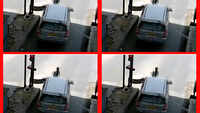‘Social relevance behind success of dairy co-ops’
Prashant Rupera | TNN | Apr 14, 2019, 04:05 IST
Vadodara: Gujarat’s dairy co-operative movement is widely hailed for its success. But the reason behind the success of dairy co-operative societies (DCS) spread across thousands of villages in the state is not just economic.
A latest study by researchers of the Verghese Kurien Centre of Excellence (VKCoE) at the Institute of Rural Management Anand (IRMA) reveals that the dairy co-operatives owe their success as they have remained socially relevant even after five decades.
VKCoE researchers had conducted a study titled information sharing ties in DCS to explore the effects of social networks in a DCS on dairy business networks and vice versa.
It was two decades ago that India surpassed the United States to emerge as world’s largest milk producer. “India’s milk production success story is largely owed to DCS that had started out in the late 1940s. Some dairy cooperatives, which are now over six to seven decades old, have become social entities in their own right, forging strong community ties,” said professor Shyam Singh, a social sciences professor who along with research officer Neha Christie conducted the study.
The study defined a dairy information network (DIN) as one where members share information on dairy-related matters such as vet services, animal health, animal feed, milk sales though the DCS and financing.
A social information network (SIN) was defined as a network where members share information on social matters such as marriage, functions, friendship, personal life, cultural events and events/incidents taking place in the village.
For the study, the researchers analysed DCS at Dolapura, a five-decade-old society under Amul Dairy, which has 340 members, comprising around 95 % of the total households in the village.
“There are social differences in every village. But villagers come together to achieve their common economic goals through DCS. This indicates that this economic convergence through the DSC has scope for nurturing social harmony and co-existence,” said Singh.
“Dairy co-operatives have established their social roles within the societies. They participate in community affairs like festivals, distribute food or contribute monetarily or non-monetarily in cultural and social functions, support programmes organized at schools within the villages and also help farmers in distress through advance payments,” he said.
“We observed that members of DCS maintain separate networks for their dairying ties vis-vis social community ties. They do this to keep their dairy network free from societal conflicts and complexities. This could be one of the reasons why the dairy cooperative society has been able to sustain its operations for decades with an ever-increasing turnover of milk collection and sales,” said Singh.
A latest study by researchers of the Verghese Kurien Centre of Excellence (VKCoE) at the Institute of Rural Management Anand (IRMA) reveals that the dairy co-operatives owe their success as they have remained socially relevant even after five decades.
VKCoE researchers had conducted a study titled information sharing ties in DCS to explore the effects of social networks in a DCS on dairy business networks and vice versa.
It was two decades ago that India surpassed the United States to emerge as world’s largest milk producer. “India’s milk production success story is largely owed to DCS that had started out in the late 1940s. Some dairy cooperatives, which are now over six to seven decades old, have become social entities in their own right, forging strong community ties,” said professor Shyam Singh, a social sciences professor who along with research officer Neha Christie conducted the study.
The study defined a dairy information network (DIN) as one where members share information on dairy-related matters such as vet services, animal health, animal feed, milk sales though the DCS and financing.
A social information network (SIN) was defined as a network where members share information on social matters such as marriage, functions, friendship, personal life, cultural events and events/incidents taking place in the village.
For the study, the researchers analysed DCS at Dolapura, a five-decade-old society under Amul Dairy, which has 340 members, comprising around 95 % of the total households in the village.
“There are social differences in every village. But villagers come together to achieve their common economic goals through DCS. This indicates that this economic convergence through the DSC has scope for nurturing social harmony and co-existence,” said Singh.
“Dairy co-operatives have established their social roles within the societies. They participate in community affairs like festivals, distribute food or contribute monetarily or non-monetarily in cultural and social functions, support programmes organized at schools within the villages and also help farmers in distress through advance payments,” he said.
“We observed that members of DCS maintain separate networks for their dairying ties vis-vis social community ties. They do this to keep their dairy network free from societal conflicts and complexities. This could be one of the reasons why the dairy cooperative society has been able to sustain its operations for decades with an ever-increasing turnover of milk collection and sales,” said Singh.
Making sense of 2019
#Electionswithtimes
View Full Coverage
































All Comments ()+^ Back to Top
Refrain from posting comments that are obscene, defamatory or inflammatory, and do not indulge in personal attacks, name calling or inciting hatred against any community. Help us delete comments that do not follow these guidelines by marking them offensive. Let's work together to keep the conversation civil.
HIDE